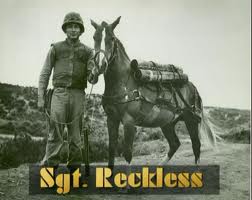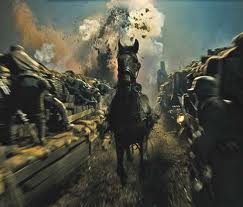Jan
17
A HORSE NAMED RECKLESS
Filed Under Combat PTSD, Sgt. Reckless, Tears, Tears of a Warrior, War, War Horse | Comments Off on A HORSE NAMED RECKLESS
by Janet J. Seahorn, Ph.D
Amazing story!
This was sent to us recently from one of our readers, Larry Mathena. We had just seen Steven Spielberg’s movie, War Horse, which chronicled (even fictionally), the high cost of war on horses during WWI.
Like people, our four-legged comrades share similar emotions of friendship, love, pain, and grief.
Reckless, however is a true story of a courageous animal that fought in the Korean War.
Read on and view the video. I am sure it will touch many of your hearts like it did ours.
A special thanks to Larry for sharing this heroic story.
|
Jan
10
THE MAN I DIDN’T KNOW
Filed Under Combat PTSD, Family, PTSD, Tears of a Warrior, The Man I Didn't Know, Veterans, Vietnam Veterans, War | Comments Off on THE MAN I DIDN’T KNOW
by Janet J. Seahorn, Ph.D
This is the title of a book sent to us by Marie Leduc, the wife of a Vietnam Veteran who co-wrote it with retired naval aviator, Art Schmitt, Ph.D. Later Art got his degree in psychology. The Man I Didn’t Know: The Stories of Wives and Families of Vietnam Veterans who suffer from “Post Traumatic Stress Disorder”, is a collection of stories and poems written from the perspective of those most directly impacted by combat.
The articles are heartrending and the poetry will literally place you in the hearts and souls of the writers. While reading through the many tales I found several statements pretty sobering and thought provoking. Some statements gave me an unusual viewpoint of war, especially the last few wars we have fought and left without a clear victory. I have included several small snippets of some of these in this blog.
- “The United States did not lose the war in Vietnam, the South Vietnamese did. The last American troops left Vietnam on March 29, 1973, (however, the last flight out wasn’t until 1975). We did not lose the war… we stopped fighting” (p. 16). Recently, December 15, 2011 we raised the last American flag as we leftIraq. I wondered if years down the road we will describe this last conflict in a similar manner.
- “There are two kinds of PTSD… acute, which is treatable, and Chronic, which is manageable”. More Vietnam veterans, per capita, suffer from chronic PTSD than from any other war. The reasons for this is unknown, but it may be that it was an unpopular war and the veterans were not welcomed home” (p. 16).
- In another article, To Answer Your Question, by Ed Ruminski, the veteran is trying to explain to his son what combat was like, how time stopped and actions were both quick and in slow motion. How he had to be “constantly watching, listening to my senses”. In the end he merely states, “They call it war, and to answer your question son, yes, I have killed somebody. What I was unaware of was how by that process I just described, I was also killing myself” (p.19). Sadly, many of our Iraq and Afghanistan troops are returning with parallel sentiments.
 These are just a few statements from the book. The various writings describe the wounds of the minds, how scary it can be for a family to negotiate the many behaviors and emotional ups and downs of their beloved warrior, how a mother must learn to cope with the death of her son while visiting the Vietnam Wall to stay connected, and how PTSD affects children when their under developed minds and bodies leave them vulnerable to actions which they may never fully understand. In the end, this last quote by Jacqueline McVicar (p. 85) really says it all.
These are just a few statements from the book. The various writings describe the wounds of the minds, how scary it can be for a family to negotiate the many behaviors and emotional ups and downs of their beloved warrior, how a mother must learn to cope with the death of her son while visiting the Vietnam Wall to stay connected, and how PTSD affects children when their under developed minds and bodies leave them vulnerable to actions which they may never fully understand. In the end, this last quote by Jacqueline McVicar (p. 85) really says it all.
“His fight was in Vietnam,
Ours is the Vietnam in him.”
Ordering information: ISBN: 1-4196-2452-0 www.booksurge.com 1-866-308-6235







